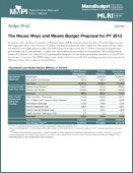Benefits of Slower Health Care Cost Growth for Massachusetts Employees and Employers

The House Budget Proposal for FY2013
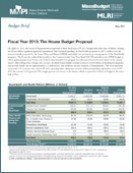
A brief summarizing the House FY 2013 budget proposal for MassHealth and other health coverage programs.
Fiscal Year 2013: House and Senate Budget Comparison Brief
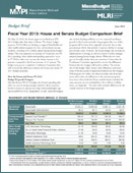
This budget brief compares the House and Senate Fiscal Year 2013 (FY 2013) budget proposals for MassHealth (Medicaid) and other health care programs. It is the fourth in a series of fact sheets published by the Massachusetts Medicaid Policy Institute (MMPI) and produced by the Massachusetts Budget and Policy Center in partnership with the Massachusetts Law Reform Institute.
Sick in Massachusetts: Views on Health Care Costs and Quality

This poll – conducted in April and May 2012 by researchers at the Harvard School of Public Health – asked “sick” Massachusetts residents a series of questions related their perception of health care costs and quality in Massachusetts, the reasons for cost and quality problems, and their personal experience with cost and quality issues. The results showed that sick residents are very concerned about health care costs in Massachusetts, and some struggle with their own costs of care. Though respondents were less troubled by the quality of care in the state, there were indications of problems, especially around care coordination and communication. The poll was conducted in partnership with 90.9 WBUR and the Robert Wood Johnson Foundation.
UPDATED MassHealth: The Basics - Facts, Trends and National Context
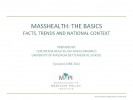
UPDATED chart pack, prepared by the Center for Health Law and Economics at the UMass Medical School, including summary data on MassHealth enrollment and spending. Designed to support use of the charts in presentations.
Massachusetts Under the Affordable Care Act: Employer-Related Issues and Policy Options

This report, written by researchers at the Urban Institute, explores four policy options for assessing employers who do not provide affordable health insurance coverage to their workers as Massachusetts brings its state health reform law into compliance with the federal Patient Protection and Affordable Care Act.
MassHealth and Health Reform Funding in the FY 2013 General Appropriations Act
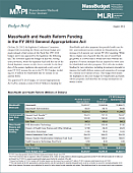
This budget brief highlights the FY 2013 budget for MassHealth and health reform programs. Since FY 2012, MMPI has produced budget fact sheets on the budget proposal for MassHealth (Medicaid) and other health care programs for each stage of the development of the state budget as the budget moves through the legislature. Click here to see the full collection.
MassHealth and Health Reform Provisions in the June FY 2012 Supplemental Budget
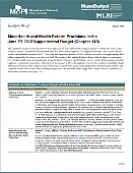
This budget brief describes authorization of the Delivery System Transformation Initiatives (DSTI) Trust Fund and statutory changes to support implementation of the Affordable Care Act (ACA).
Business Community Participation in Health Reform: The Massachusetts Experience

This report funded in part by the Foundation explains how and why Massachusetts business leaders became involved in health reform and the difference their engagement has made and presents the perspectives of individual entrepreneurs, business owners and executives on how Massachusetts health reform has affected their companies, their employees and the overall business climate in Massachusetts.
Chapter 224 of the Acts of 2012: Implications for MassHealth
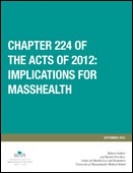
This report, written by Robert Seifert and Rachel Gershon of the Center for Health Law and Economics at UMass Medical School, examines the key components of the most recent Massachusetts health reform law - Chapter 224 of the Acts of 2012 - as they pertain to the Massachusetts Medicaid program (“MassHealth”). Under the new law, MassHealth will be subject to the annual spending growth benchmark and will be required to implement alternative payment arrangements for most of its members, among other new requirements and responsibilities. For a broader overview of Chapter 224 of the Acts of 2012, see the Foundation’s report: Summary of Chapter 224 of the Acts of 2012. For additional information about scheduled stakeholder meetings, grant opportunities, and other implementation updates, see the state's website, Implementing Health Care Cost Containment.
Chapter 224 of the Acts of 2012: Implications for MassHealth

This report, written by Robert Seifert and Rachel Gershon of the Center for Health Law and Economics at UMass Medical School, examines the key components of the most recent Massachusetts health reform law - Chapter 224 of the Acts of 2012 - as they pertain to the Massachusetts Medicaid program (“MassHealth”). Under the new law, MassHealth will be subject to the annual spending growth benchmark and will be required to implement alternative payment arrangements for most of its members, among other new requirements and responsibilities. For a broader overview of Chapter 224 of the Acts of 2012, see the Foundation’s report: Summary of Chapter 224 of the Acts of 2012. For additional information about scheduled stakeholder meetings, grant opportunities, and other implementation updates, see the state's website, Implementing Health Care Cost Containment.
Summary of Chapter 224 of the Acts of 2012

This report – written by Anna Gosline and Elisabeth Rodman of the Blue Cross Blue Shield of Massachusetts Foundation – summarizes the key components of Chapter 224 of the Acts of 2012, “An Act Improving the Quality of Health Care and Reducing Costs Through Increased Transparency, Efficiency and Innovation,” which was signed into law on August 6, 2012. The law aims to control health care cost growth through a number of mechanisms, including the creation of new commissions and agencies to monitor and enforce the health care cost growth benchmark, wide adoption of alternative payment methodologies, increased price transparency, investments in wellness and prevention, an expanded primary care workforce, a focus on health resource planning, and further support for health information technology, among others. For a more in depth look at the Medicaid provisions in the law, see the Foundation’s report: Chapter 224 of the Acts of 2012: Implications for MassHealth. For additional information about scheduled stakeholder meetings, grant opportunities, and other implementation updates, see the state's website, Implementing Health Care Cost Containment.
Trends in Federal Revenue to Support MassHealth
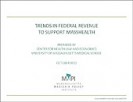
Chartpack providing an overview of trends in federal revenue to support MassHealth.
Chapter 224: What Does It Mean for Hospitals, Health Plans, Consumers, and Clinicians?
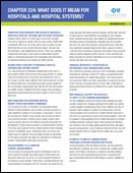
These fact sheets highlight the major implications of Massachusetts’s 2012 health care cost containment law, Chapter 224, for four key stakeholder groups: hospitals, health plans, consumers, and clinicians. From increased data reporting requirements for hospitals and health plans, to greater cost transparency for consumers, Chapter 224 will have significant impacts on many aspects of the Massachusetts health care system in the years ahead.
For a comprehensive overview of the entire law, see the Foundation’s report: Summary of Chapter 224 of the Acts of 2012. For an in-depth look at the Medicaid provisions in the law, see the Foundation’s report: Chapter 224 of the Acts of 2012: Implications for MassHealth.

